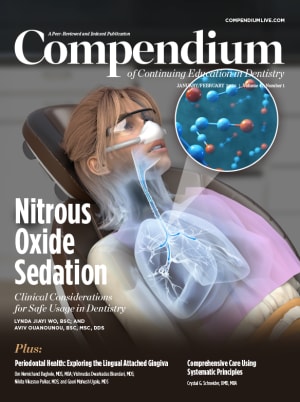Kerr VPS Materials Deliver Performance, Ease of Use
When it comes to dental impression materials, Kerr Corporation’s James Lobsenz, Senior Product Manager, believes that despite ample opportunities for advances in chemistry, “a growing area of development is focused on how people use different products.” This, in turn, can lead to innovations in areas such as product packaging and education.
“With impression materials, it’s a combined focus on mechanical properties and the technique required to get a good result,” says Lobsenz. “Because there is such a wide variety of techniques and different clinical requirements, you can end up with a lot of different product variations.”
Most of Kerr’s impression products feature vinyl polysiloxane (VPS), which Lobsenz says offers “the best balance of performance and ease of use in most situations.” The company’s Take 1® Advanced™ is a final impression material that, Lobsenz maintains, is popular because of its combination of mechanical properties and a wide range of delivery methods and set times. Citing feedback from clinicians, he says the versatile Take 1 Advanced offers good value in that it outperforms other, more expensive materials, and its ease of use and mastery “works well in many doctors’ hands, giving them a great result on the first try.”
Another leading impression product from Kerr is AlgiNot™, an alginate alternative that Lobsenz says replicates alginate’s favorable characteristics while improving upon its strength and dimensional stability, which are considered to be alginate’s weaker points. “Because traditional alginate is so hydrophilic, AlgiNot’s affinity with water, which enables it to pick up detail in the presence of oral fluids, is its most distinctive feature,” Lobsenz claims. Also like alginate, AlgiNot is a highly cost-effective impression material.
In addition, says Lobsenz, Kerr’s Extrude® is a popular VPS impression system available in a range of viscosities to handle various techniques; Permlastic® polysulfide or rubber-base material is particularly well suited for denture work; and Impression Compound is ideal for specialized techniques and as an accessory.
Kerr offers a variety of approaches to educating clinicians about its products. In addition to technique cards and detailed instructions with which the products are packaged, an online troubleshooting guide is available that identifies common impression problems and suggests solutions. In addition, Kerrdental.com’s product selection guide enables customers to compare materials from various manufacturers and get specific recommendations for Take 1 Advanced based on their specific needs. Also, Kerr sales representatives are fully equipped to offer solutions and assistance.
Because it is important for an impression material to perform consistently, the company strives to ensure that its materials meet a rigorous quality standard. Materials are tested throughout the manufacturing process and just before shipment. In addition, samples of each batch are retained through the product expiration date. “We make sure the viscosity, working time, and mechanical properties are in line with the formula,” explains Lobsenz.
Lobsenz stresses the importance of using materials at their stated temperature because this can affect the material’s working time. He believes a future focus of Kerr will be on developing ways to help clinicians overcome problems with working time as well as other challenges associated with impression-taking such as tissue management.
Lobsenz expects the chemical impression market to keep growing even with the advent of digital impressioning, and says Kerr will continue to offer ever-improving VPS impression products. “Although the day will come when impression-taking will largely be a digital process, that time is not now,” he insists. “Our impression sales have increased even during a time when ease of use has improved for intraoral scanning and CAD/CAM systems.”
“Clinicians will be taking chemical impressions for quite some time,” says Lobsenz, adding that Kerr will maintain a close watch on trends towards digital impressioning and organize its business accordingly.
Kerr Corporation
1717 West Collins
Orange, CA 92867
800-537-7123
www.kerrdental.com
